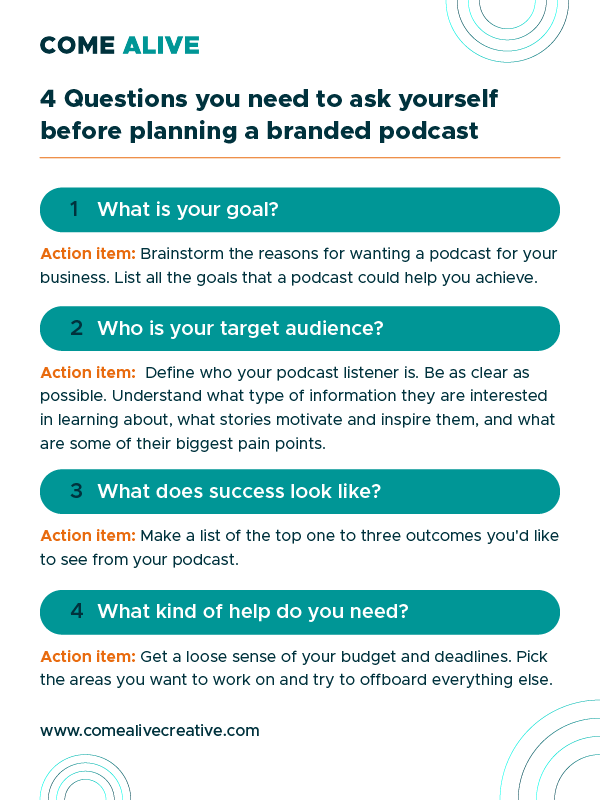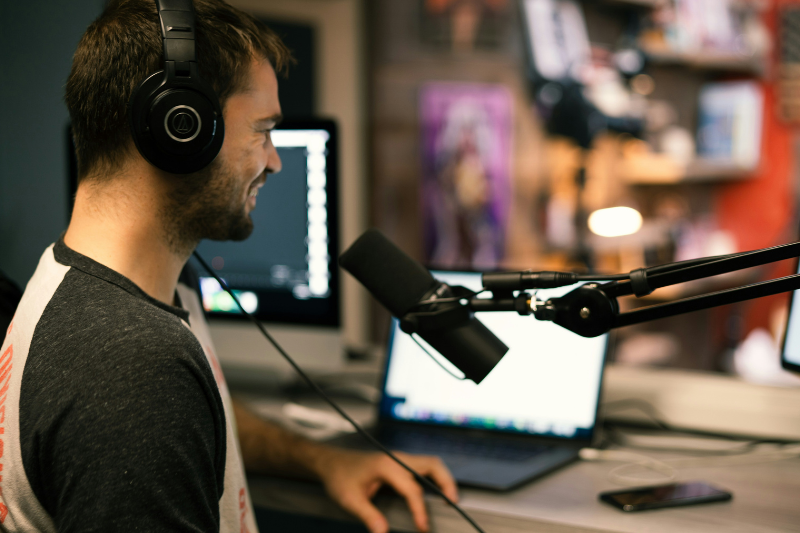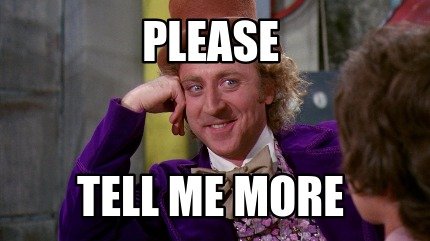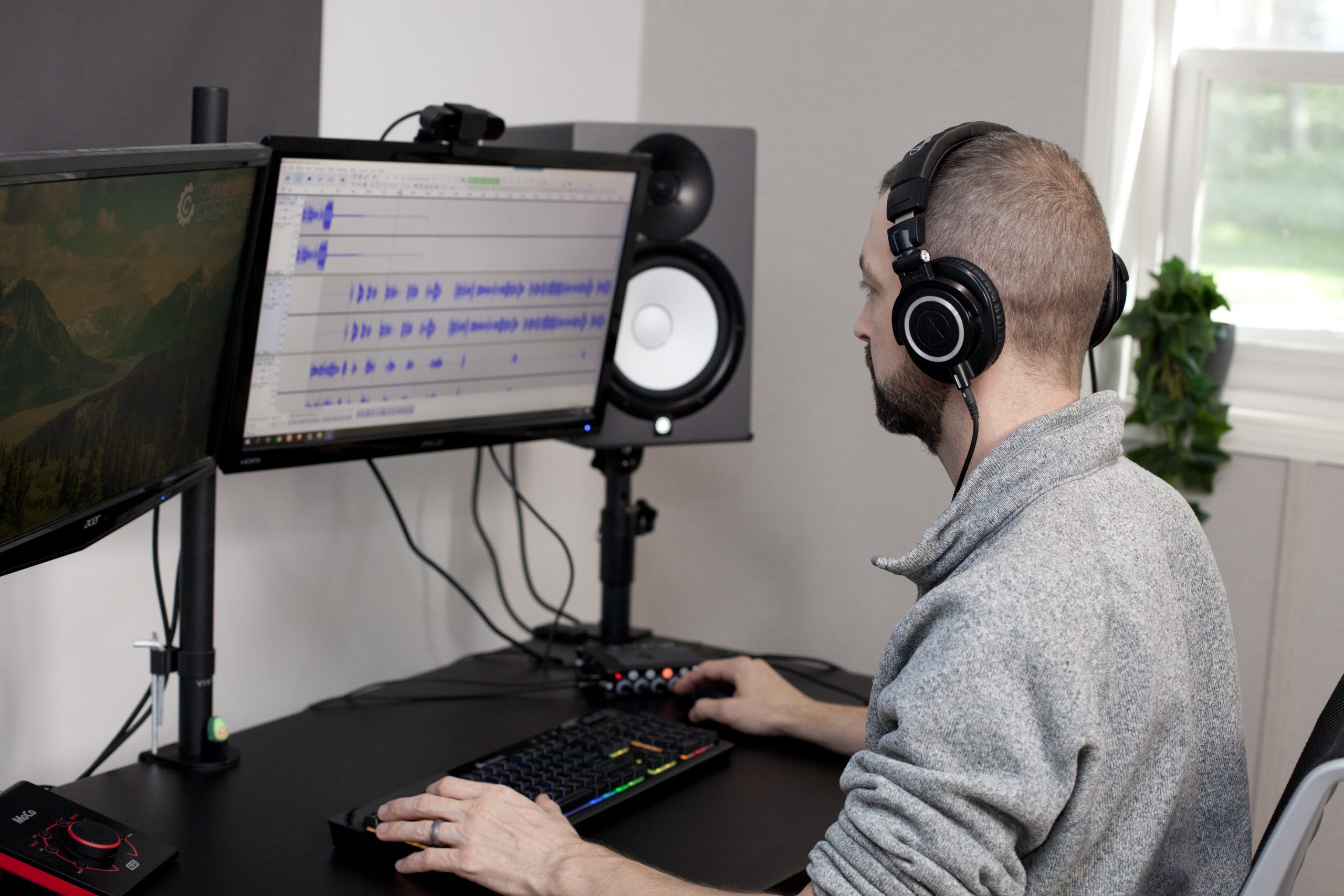Starting a high-quality podcast is not easy. Most “how-to” guides are confusing, conflicting, and incomplete. They focus on basic setups for individuals who are just getting started. However, when you are an established business, you have to protect your reputation and ensure that your podcast has the highest quality possible. And if you want to accomplish this, you’ll need expert advice.
Personally, I’ve been podcasting since 2012, producing podcasts for clients since 2016, and working in audio for over 20 years. Even with this kind of experience, I’m learning something new every day. I’ve also surrounded myself with a team of specialists who make it possible to accomplish more than I ever could on my own.
What I’ve found is that most of the businesses I talk to are trying to figure out what to do, who to trust, and how to find the right kind of help.
If that sounds familiar, this article is for you.
I’ve broken this article into the following “helpful topics.” Skip around as needed.
- Four questions you need to answer about your project before you start looking for a podcast producer.
- What you need to know about the podcast industry to have effective search results.
- How to evaluate and choose the best podcast production company.
- 6 Podcast production companies you should consider working with.

4 questions you need to answer before you start searching for the top podcast production companies.
Too often, people start looking for help before they even know what they are doing. To be honest, too often, people start podcasting before they know what they are doing!
You need to get clear on four things before you start your podcast:
- What is your goal?
- Who is your target audience?
- What does success look like?
- What kind of help do you need?
Question 1: What is your goal?
My clients don’t want a podcast for the sake of having a podcast. They want one because of what it can do for them. Most of the time, podcasting is a means to an end.
Defining your goal is one of the most important things you can do because it will influence everything about your podcast… From the show style to what kind of help you should hire to how much production should cost.
Action item #1: Brainstorm the reasons for wanting a podcast for your business. List all the goals that a podcast could help you achieve. Our clients’ most common goals are:
- Establishing authority in a space
- Generating new leads and sales
- Networking with others
- Teaching and reaching prospects, clients, and teams
- Influencing large groups of people
Bonus tip: If you’re not 100% sure what your goals are, use the 5 Whys Method to get to the real goals that are motivating you to launch a branded podcast. Here is an example:
Original goal: To have a lot of listeners.
First why: Why do you want a lot of listeners?
Answer: So lots of people will know about our company.
Second why: Why do lots of people need to know about your company?
Answer: We’re launching a new e-commerce service next quarter, and we want to get lots of new leads.
Real goal: We want the podcast to raise awareness around our new e-commerce service…
Question 2: Who is your target audience?
It’s much easier to create a meaningfully branded show that helps you fulfill your goal when you understand your audience.
The most common target audiences include your existing audience and peers in an industry you want to be serving.
Action Item #2: Define who your podcast listener is. Be as clear as possible. Understand what type of information they are interested in learning about, what stories motivate and inspire them, and what some of their biggest pain points are.
Bonus tip: Conduct audience research by interviewing people within your target audience. This will help you understand who they are and what information they are seeking.
Question 3: What does success look like?
Podcast success goes beyond the number of listeners and downloads. In fact, there are other metrics that will be more indicative of the progress you are making toward your goal, depending on your goal. If you don’t define what success looks like for your podcast, you will never deliver the right outcomes.
Success might look like a variety of things:
- A certain number of podcast downloads.
- Increased website traffic.
- Increased social media interactions.
- Strong consistency of episode-to-episode listens.
- High episode completion rates.
- Positive reviews and social proof.
- New and/or improved relationships.
- New prospects, leads, and sales.
- Invitations to speak at events or other podcasts.
- Sponsorship agreements.
Make sure your goals are realistic and in line with what a podcast can actually accomplish. I frequently find myself teaching our clients (especially the ones who are marketers) how to properly evaluate their podcasts. That’s why I wrote a whole article about podcast analytics.
Action Item #3: Make a list of the top one to three outcomes you’d like to see from your podcast. You can read my articles on how to define podcast success and podcast analytics to gain more clarity on different podcasting metrics.
Question 4: What kind of help do you need?
There are three main types of help you can get in the podcasting space:
- Podcast Consulting and Education. This is where a person or business teaches you how to produce podcasts, and you do it yourself.
- Technical Solutions. In this case, a person or podcast production agency handles technical tasks like editing, show notes, or posting online, while you focus on the strategy, production, and project management.
- Full Service Podcast Production. Full podcast production solutions typically involve teams that handle everything from planning a show concept to consistently producing and posting episodes.
The main variables you need to consider are time, budget, speed, and expertise. How much time does your team have to spend on this project? What is your budget? When are your deadlines? How important is it that you get it right the first time? Having a sense of the kind of help you need will help you know what to look for in a podcast production company.
Action Item #4: Get a loose sense of your budget and deadlines. Pick the areas you want to work on and try to offboard everything else.
Bonus tip: Rand Fishkin from SparkToro wrote a great article on Why You Should Hire Agencies & Consultants (for everything you can). It might help you decide what kind of help you actually need.

What you need to know about the industry to have effective search results.
Jargon exists in every industry. Podcasting is no different. You’ll get better search results once you understand what you’re looking for and how to talk about it.
Using the right phrases when searching the web.
1) Searching for companies directly.
Are you ready to start searching directly for a team or resources to help you with your podcast production? Certain terms are more popular in search than others.
If you are looking to hire a podcast production team, the most common search terms are:
- podcast production companies (about 450 to 870 average searches per month, according to Mangools and Ahrefs)
- podcast production services (about 250 to 350 average searches per month)
- podcast production agency (about 300 to 400 average searches per month)
The phrase “podcast production team” is significantly less popular, with 10 to 40 average monthly searches.
If you are looking for consultants or resources to teach you how to podcast, the most popular terms are:
- how to start a podcast (35K to 50K average monthly searches)
- how to make a podcast (7K to 10K average monthly searches)
Phrases like “How to create a podcast” and “How do you start a podcast” are less popular, with 1K to 2K searches per month.
The one thing to watch out for is companies running ads to get on the front page search results. The terms are popular, so of course, companies want to rank for them. There is nothing wrong with running ads (we do it off and on) but they don’t guarantee quality and reliability.
2) Searching for companies indirectly.
You can also indirectly search for companies by researching questions you have about podcasting. For example, when you search “podcast ROI,” our article 9 Ways to Determine the ROI of Your Podcast will likely come up.
Many of our prospects and clients have found us this way because they read the articles, appreciate our insights, and want to strike up a conversation. It’s a more organic way to connect than scrolling our homepage, and it often becomes a win/win for both parties.
Understanding the language and terms of the podcast industry.
Unfortunately, the people in the podcast industry aren’t uniform in the language they use to describe it. Audio “editing” and “producing” technically mean different things but are often used interchangeably.
The result is a lot of potential confusion.
Beyond this, there are plenty of services and tasks companies like to list because they sound nice.
For example, audio editing, noise reduction, audio cleaning, audio mixing, premium editing, audio equalization, and broadcast standards basically mean we’ll make your podcast sound professional.
Dynamic balancing and volume matching typically mean we’ll make the audio of different people talking have a similar volume level so they sound good.
I even saw one company list “sync multi-track channels.” Without getting too technical, oftentimes, the interview host and podcast guest are recorded separately (on different channels) to make editing easier. Sync multi-channels simply means lining things up so the timing is correct.
These are all things podcast production companies should be doing. Could you imagine a company not syncing channels and the conversation being all out of whack?!
The moral of the story? When in doubt, ask what things mean, and don’t be wowed by basic standards of practice being met.
Bonus Tip: If you are a word geek like me, check out Podcast Taxonomy and download their White Paper. It’s a document where multiple people in the industry came together and put a common vernacular to podcast production. Did you know there are 8 different roles under podcast creative direction and 7 under audio post-production? Do you even know what post-production is? You will now. 🙂

How to evaluate and choose the top podcast production company for you.
With the podcast market being valued at USD 18.52 billion in 2022 according to Grand View Research, you can imagine the number of podcast production companies and independent podcast producers trying to serve the industry. The industry has grown so much in recent years, that people are searching how to start a podcast production company! Point being, you have lots of choices and all companies are not created equal.
Ask yourself the following nine questions when choosing who you want to work with:
1. Do you need a podcast specialist or podcast production team?
If you plan on handing off most of the work so you can focus on other responsibilities, or if you want to get your podcast setup and published fast, hire an experienced full-service team. They will be better equipped to properly handle all the moving pieces of your podcast and complete it in a timely manner.
Individual podcast producers are good for specific tasks like audio editing, but struggle with handling multiple tasks and clients at scale. Keep in mind that hiring teams is more expensive than hiring individuals.
2. Does the podcast production team have an area of specialization?
Specialization can be viewed in 3 different ways:
- In the services offered.
- In the type of shows produced.
- In the content area focus.
What service specialization looks like.
I’m hesitant anytime I see a service company say they are specialists and then list a ridiculous amount of services they provide. For example:
“We specialize in web design, web development, affiliate marketing, influencer marketing, email, SMS, app development, search engine optimization, Facebook, Instagram, TikTok, Pinterest, Snapchat, Twitter, display ads, audio ads, video production, podcast production, search, drop-shipping, e-commerce, SaaS…”
No, you don’t. That’s not specialization. Stop it.
For this reason, it’s important to know what is reasonably considered specialization in the podcast space and what to watch out for.
“Strategy is making tradeoffs in competing. The essence of strategy is choosing what not to do. Without tradeoffs, there would be no need for choice and thus no need for strategy.”
—Michael E. Porter, What Is Strategy?
Some agencies will focus on a specific task in the production process, and others will focus on all the tasks in the podcast process. Both options are reasonable.
For example, you can go to UpWork and search for a podcast or audio editor. They might specialize in only audio editing or do audio and video work. However, it’s very difficult for an individual to handle all the steps of the podcast process at scale for multiple clients.
On the other hand, many agencies have teams to handle the whole process at scale. For example, at Come Alive, we offer full-service podcast production and focus on four areas:
- Planning
- Production
- Production
- Tracking Progress
In order to offer all of that, we have specialized project managers, audio engineers, music composers and sound designers, producers and copywriters, and graphic designers to handle the full service podcast production.
The only way to actually specialize is to have experience over a long period of time and/or the talent on your team to handle all the different skills necessary.
Watch out for digital marketing agencies that are trying to break into the podcast industry. I’m seeing more of this lately and have been approached by a handful of marketing agencies trying to learn this space.
It might be a “red flag” if you’re considering a digital marketing firm that offers podcast services alongside a bunch of other non-related services.
What it means to specialize in podcast formats.
Generally speaking, there are a few different styles of podcasts you can produce:
- Solo/Interview-based
- Narrative/Story-driven
- A mixture of the two
Does the production company you are considering specialize in a style?
If so, what style and how do you know?
Try to find a company that has significant experience creating the style of show you are interested in making.
Watch out for language like “we can do that” or a lack of evidence for the desired show type. This is especially true for narrative shows. Narrative shows require a tremendous amount of planning, interviewing, scripting, editing, revising, more interviewing, more scripting, composing, and… you get the point.
Just because someone produced an interview-based podcast DOES NOT mean they can produce a narrative podcast.
Even professionals with experience in similar fields don’t always know what to do. I recently had a discovery session with an award-winning radio talent and a recognized movie director. They could outclass me in story development and execution, but neither could help you produce a podcast.
Content area or vertical specialization.
Another way podcast production companies specialize is by focusing on specific content or on a vertical. I know of agencies who specialize in real estate, business-to-business (B2B), and even farming.
Not kidding. We lost a bid for an agricultural podcast to a podcast agency that specializes in farming podcasts. Crazy times…
This can be a factor in who to hire, but I prefer to look at a company’s expertise. For example, we are currently producing podcasts for health care, real estate, media sales, massage therapy, air purification, home services, and executive leadership.
Do we need to be an expert in each one of those areas? Nope.
Our clients are experts in the content and help us with the nuances we should understand. We’re experts in helping them get results with their podcasts, and those principles are the same no matter the content.
3. Is the podcast producer actually an expert?
There are a decent amount of people and companies trying to get in on the podcast wave. I have an abundance mentality, and it is exciting to be a part of a growing industry. However, many of these newer and younger podcasters have no business saying they are experts and often give terrible advice.
For example, in researching this article, I came across one company that stated their CEO put together two popular podcasts so they knew the niche “inside and out.” Two podcasts and you’re experts now? Please, tell me more…

You have to vet the help you are considering. Get them on the phone or on a Zoom call. Ask them questions about how they work, what their favorite projects are, and what projects were the most difficult. Get them to send you examples and testimonials or case studies. If possible, talk to some of their clients.
Watch out for disconnects in what the website portrays and what the sales person says. It’s easy to fake expertise online.
For example, I know of one production company who word-for-word copy/pasted another production company’s homepage. It’s my friend’s company, and he found out because the thief was stupid enough to leave the hyperlinks that pinged back to the original website!
Don’t let yourself be duped by someone like this.
4. What systems and processes does the production company use?
Clear systems and processes are a sign of expertise. Processes take time to develop, document, follow, and refine. They make high-quality work consistent and easily repeatable.
As noted earlier, we follow a 4-part process:
- Plan
- Produce
- Promote
- Track Progress
We have Basecamp templates designed to spin up new projects with the press of a button, and a company wiki with corresponding how-tos for every step of producing a results-driven podcast. It makes it incredibly easy to get our team on the same page and is part of the reason our fulfillment flows so smoothly.
“Jeff and his team have been instrumental in taking our podcast to the next level. We were trying to do it all ourselves in-house, and bringing Jeff on was the best decision. He and his team have transformed our entire production process, including the equipment, recording, editing, marketing, and strategic direction.”
John Sweeney, CFA, COO at Park Madison Partners

Whoever you decide to work with should have tested and proven processes and systems.
5. Who will be working on your podcast?
This is an important factor to find out about when vetting companies.
Sometimes, it’s the person who sells you the service. Sometimes it’s not. Some companies keep service in-house, and others contract to editors from other countries. Some companies put dedicated individuals or teams on your show. Others put your episodes in a queue to be edited by whoever is available first.
For my team, we keep everything in-house (no random outsourcing) and we organize our team, so each project has a core team. You’ll likely talk to me for the sales call and if you decide to go with us, I’ll introduce you to your project manager, who runs the day-to-day. And in the rare occurrences when someone else needs to jump in and help because of emergencies or vacations, we have clear systems to keep your podcast consistent.
6. What are you actually paying for?
The cost of podcast production services varies greatly. It can range from ten to thousands of dollars per episode. In most cases, the cost should be justified depending on what kind of show you’re producing and what kind of podcast services the product team is providing.
However, you should watch out for unnecessarily inflated costs. Some teams have physical locations and large offices. This creates higher overhead and business expenses that typically get factored into your quotes. Also, the teams who aren’t experts or don’t have systems in place (covered above) run inefficiently and thus have higher costs (or don’t know how to properly price, to begin with). Another area you may see this in is how the company handles things like episode revisions or out-of-scope work.
For us, our team is fully remote and distributed. We’ve been running it that way since we launched in 2014. We are intentional with the tools and software we invest in, and we run a tight and mighty team. The result? We are able to put the costs towards getting the work done well. We focus on what matters.
7. Where is the production team located?
Similar to if the production company has a physical location, I’ve noticed many people search the phrases “podcast production in (specific city)” or “podcast production near me.”
It isn’t necessary to be near the production team you want to hire. With today’s technology, working fully remotely is completely acceptable and often preferred. My whole team and all of our clients are remote.
Only in special circumstances will you need to be in the same location. For example, if you want to rent studio space to record. However, even then, you don’t need a podcast studio. Most general audio recording studios are well-equipped (even better equipped) to help you record a podcast.
8. What are the company’s values?
This one is extremely important, but difficult to judge. Many companies haven’t thought about their values (especially if they are young) or they have values they don’t practice.
Values are the way companies do business. They act as a guide for how a company conducts itself. Every company has them, it’s just nice to know what they actually are before entering into an agreement.
Our values became very clear when we started using the Entrepreneurial Operating System (EOS) to run our business in 2019. EOS is a simple system that has had a huge (positive) impact on our business.
We have four values that guide everything we do: charity, expertise, intentionality, and integrity (you can read how we define them on our About page). They guide how the team is held accountable, how we conduct ourselves in business, and how we plan for the future.
9. Do you get along?
This is an often underrated yet seriously influential piece of success. Podcasting is a longtail move. We’ve been working with some of our clients for over four years. Other clients have come back to work with us more than once. Long term relationships don’t work if you aren’t committed and enjoy the company of the other person.
Again, talk to the team you will be working with. Listen to your gut and choose the company that can do the job and who you want to work with.
Watch out for companies who say yes to everyone. Not everyone is a good fit. We turn away prospects for a variety of reasons, and that’s ok. We love what we do and want to continue loving what we do while working with amazing clients!
Also, watch out for companies that treat you as a number. You can usually tell this if they talk more about themselves, what they can do, and/or the sale. It’s a huge red flag if they aren’t asking you questions about your needs, or they aren’t listening in general. Companies like this typically don’t care, and you get nickel-and-dimed for it later.
“We chose Come Alive Creative over the competition because, in all sincerity, they cared more.”
Cheryl McRae, Former Director of Corporate Marketing at Scorpion

6 Recommendations of top podcast companies.
There is a lot to consider when hiring a podcast production company. Hopefully this article has given you insight into how to choose the right podcasting help for your goals and needs.
With that said, I want to offer a few suggestions of companies to consider.
You might be wondering, “Jeff, why are you suggesting your competition?!”
Because I really want you to find the best help.
I actually believe there is plenty of work to go around.
Podcasting is an amazing medium to work with, and it’s my hope you can find the perfect fit for your company.
A few notes:
- Tons of production teams exist.
- I know some of the following companies personally and others I don’t.
- No one has asked to be on the list (and for the love of all things holy, do not email me asking to include your company).
- I am not receiving affiliate sales or commissions for these recommendations.
These are just a few companies I appreciate and respect.
Come Alive
If you haven’t figured it out yet, that’s us. We offer full-service podcast production to B2B founders and marketers.
Our four-part process gives you everything you need to plan, produce, publish, and track your progress.
If you’re interested in working with us, you can book a discovery session with me (Jeff) or view our podcast production services to learn more.
Lower Street
Lower Street is a next-level podcast production agency for ambitious companies. It’s based in the UK and headed up by Harry Morton. Lower Street’s current ideal clients are 7 and 8 figure agencies and enterprise companies.
Despite “technically” being each other’s competition, Harry and I connect regularly to discuss challenges and success stories around running a podcast production company. Harry is a standup gent and I would absolutely trust him with my podcast.
“We partner with agencies and enterprise companies who want to produce the best podcast in their industry to drive thought leadership, brand awareness, or new business. Having created thousands of episodes with our clients, we’ve learned what it takes to produce a next-level show that stands out from the crowd to build a loyal, highly engaged audience.”
—Harry Morton, Lower Street
Solid Gold Studios
Solid Gold is a podcast studio based out of South Africa and led by Gavin Kennedy. They currently help the DIY, small business, and large corporations but are unique in that they offer studio space and production.
I’ve only been able to chat with Gavin a few times, but I’m good friends with a few people who use his team for their podcast needs. Gavin knows his stuff, and the shows I’ve heard him produce are solid.
“To be understood, you must first be heard!”
—Gavin Kennedy, Solid Gold Studios
Cashflow Podcasting
Cashflow is a podcast launch service and production company founded by Ben Krueger. Their target audience is coaching, consulting & personal brands looking to scale their audience and client base through high-value podcasting for their communities.
I’ve had the opportunity to speak with Ben once and know someone from his team. While I’m not very familiar with the production of Cashflow’s shows, I respect the way Ben handles business and think his team has a good reputation. His team and my team service different target segments, so we often send each other prospects when they are a better fit with the other.
“You be the topic expert and the host, and partner with a team of professionals to help you host a world-class podcast that gets you more clients.”
—Ben Krueger, Cashflow Podcasting
Heard Pods
Heard Pods is an audio/video production company that empowers entrepreneurs and executives, co-founded by Adam Vazquez. Heard is another company that I’m not as familiar with their production, but I have known Adam for a while.
Adam is a smart and savvy businessman. He has been very intentional about the company he’s helping build and the clients he’s serving.
“We started Heard to embrace a hobby (audio + storytelling) but have since scaled by hiring incredibly talented producers and marketers to lead our clients’ shows.”
—Adam Vazquez, Heard Pods
Pacific Content
Pacific Content helps clients amplify their voices and connect with their audiences through originally branded audio content. They are working with big companies like Ford, Adobe, and Charles Schwab.
I haven’t interacted with Pacific Content directly, but I have a ton of respect for their team and the work they produce. I mostly follow Dan Misener and appreciate his insights on podcast development and the state of the industry (UPDATE: Dan has since left the company and started his own thing). If you’re looking for a thorough narrative-style production, check out Pacific Content.
In closing.
Thanks again for reading. Deciding on a podcast production company for your team can be difficult and confusing. Hopefully, this article will help you on your podcasting journey.
If you have any additional questions, reach out to me on LinkedIn, where I share podcasting tips, or sign up for our newsletter series to learn if having a podcast is right for your business.


